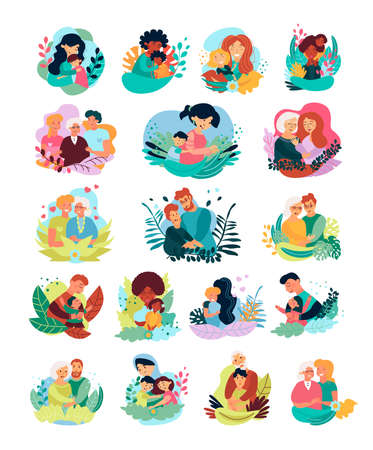1. Understanding Toddler Social Milestones
Toddlers go through many social development stages as they grow and explore the world around them. These milestones help them build important skills like communication, cooperation, and emotional understanding. While every child develops at their own pace, there are common social behaviors that most toddlers will experience.
Key Social Development Stages
Here are some of the major social milestones toddlers typically reach:
| Milestone | Description | Typical Age Range |
|---|---|---|
| Sharing | Toddlers begin to understand the concept of sharing but may still struggle with it. They might offer a toy but take it back quickly. | Around 2-3 years old |
| Taking Turns | Your toddler starts to grasp the idea of taking turns during play, though they may need guidance and reminders. | Around 2-3 years old |
| Recognizing Emotions in Themselves and Others | Toddlers begin to identify emotions like happiness, sadness, or frustration in themselves and others. | Around 18 months – 3 years old |
| Pretend Play | Your child may start engaging in imaginative play, like pretending to cook or care for a doll. | Around 2-3 years old |
| Seeking Comfort from Caregivers | Toddlers look for comfort from parents or caregivers when feeling upset or overwhelmed. | Around 1-2 years old |
The Importance of These Milestones
Toddler social milestones are crucial for developing lifelong relationship skills. Learning how to share, take turns, and recognize emotions helps children build empathy, cooperation, and problem-solving abilities. Encouraging these behaviors early can set the foundation for positive interactions with peers and adults.
What If My Toddler Isn’t Meeting These Milestones?
If your child isn’t showing signs of these social behaviors within the typical age range, don’t panic. Every toddler develops at their own pace. However, if you have concerns about their social development, consider speaking with a pediatrician or an early childhood specialist for guidance.
2. The Role of Play in Social Growth
Play is one of the most important ways toddlers learn to interact with others and develop essential social skills. As they grow, their play style evolves, helping them build friendships and understand social dynamics. Different types of play contribute to a toddler’s ability to engage with peers in unique ways.
Stages of Play and Their Impact on Social Skills
Toddlers go through different stages of play before they fully engage in cooperative interactions. Each stage helps them practice new skills that are crucial for forming relationships.
| Type of Play | Description | Social Benefits |
|---|---|---|
| Parallel Play | Toddlers play alongside each other but do not directly interact. | Helps children observe and learn from peers while feeling comfortable in a social setting. |
| Associative Play | Toddlers start to interact by sharing toys or talking but still play independently. | Encourages communication and the beginning of cooperation. |
| Cooperative Play | Toddlers actively play together, working towards a common goal or engaging in pretend scenarios. | Develops teamwork, problem-solving, and stronger friendships. |
Encouraging Healthy Social Play
You can support your toddler’s social development by creating opportunities for different types of play. Here are some simple ways to help:
Sensory and Independent Play
Toys like building blocks, sand tables, or water activities allow toddlers to explore independently while observing how others interact with similar objects.
Group Activities
Singing songs, playing simple games like “Ring Around the Rosie,” or setting up art projects encourage toddlers to share space and communicate naturally.
Pretend Play
Dress-up, toy kitchens, and dollhouses help toddlers practice real-world interactions and develop empathy by acting out different roles.
![]()
3. Encouraging Positive Social Behavior
Toddlers are still learning how to interact with others, and their social skills develop through observation and practice. As a parent, you play a key role in guiding them toward positive behavior. By modeling kindness, reinforcing good behavior, and handling common challenges with patience, you can help your toddler build strong social skills.
Modeling Kindness and Empathy
Children learn by watching the adults around them. If you consistently show kindness and empathy in your interactions, your toddler will start to imitate these behaviors. Here are some simple ways to model kindness:
- Use polite words like “please” and “thank you” when speaking to your child and others.
- Show empathy by acknowledging their feelings: “I see youre upset. Its okay to feel that way.”
- Demonstrate sharing by offering toys or food to others and encouraging your toddler to do the same.
Reinforcing Good Behavior
Praise and positive reinforcement encourage toddlers to repeat good behaviors. When they share, take turns, or express emotions appropriately, let them know you notice and appreciate it.
| Behavior | How to Reinforce It |
|---|---|
| Sharing a toy | “Great job sharing! That was very kind of you.” |
| Using words instead of hitting | “I love how you used your words to tell me what you need.” |
| Saying “please” and “thank you” | “That was so polite! Thank you for using kind words.” |
Handling Common Social Challenges
Toddlers experience big emotions but may not yet have the words to express them. This can lead to challenging behaviors like biting or tantrums. Here’s how to manage these situations effectively:
Biting
- Stay calm and firmly say, “No biting. Biting hurts.”
- Redirect their attention to a teething toy if they are biting out of frustration or discomfort.
- If they bite out of frustration, help them use words instead: “If youre upset, say Im mad instead of biting.”
Tantrums
- Acknowledge their feelings: “I see youre frustrated because you wanted that toy.”
- Stay calm and avoid giving in to demands just to stop the tantrum.
- Create a quiet space where they can cool down before discussing their feelings.
Encouraging Playdates and Group Activities
Toddlers need opportunities to practice social skills with other children. Arrange playdates or attend group activities where they can learn turn-taking, cooperation, and problem-solving in a safe environment.
4. Helping Toddlers Navigate Emotions
Toddlers are learning to understand and express their emotions, but they often struggle with big feelings. As a parent or caregiver, you can help them develop emotional awareness and resilience by teaching them how to recognize emotions in themselves and others, express their feelings appropriately, and manage frustration in a healthy way.
Teaching Toddlers to Express Their Feelings
Helping toddlers put their emotions into words is an essential part of their social development. Since they may not yet have the vocabulary to explain how they feel, you can guide them by labeling emotions as they experience them.
Ways to Encourage Emotional Expression:
| Strategy | How It Helps |
|---|---|
| Label Emotions | Saying things like “I see youre feeling frustrated because your block tower fell” helps toddlers connect words to feelings. |
| Use Emotion Books & Toys | Reading books about feelings or using toys with different facial expressions helps toddlers recognize emotions. |
| Encourage Art & Play | Doodling, playing with dolls, or role-playing can give toddlers a safe way to express their emotions. |
| Model Healthy Expression | If you say, “Im feeling frustrated, so Im going to take deep breaths,” it teaches toddlers positive ways to cope. |
Helping Toddlers Recognize Emotions in Others
Toddlers are still developing empathy and learning how to understand other peoples feelings. You can support this by pointing out emotions in everyday situations and encouraging perspective-taking.
Simple Ways to Build Empathy:
- Name Emotions in Others: If a friend is crying, say, “She looks sad. Maybe she needs a hug.”
- Use Picture Books: Ask questions like, “How do you think this character feels?” while reading together.
- Praise Kindness: When your toddler shares or comforts someone, acknowledge it by saying, “That was so kind of you!”
- Practice Facial Expressions: Make happy, sad, or surprised faces and ask your child to guess the emotion.
Building Emotional Resilience
Toddlers experience many ups and downs throughout the day. Teaching them coping strategies early on can help them handle frustration and setbacks more effectively.
Coping Strategies for Big Emotions:
- Belly Breathing: Teach your toddler to take deep breaths when theyre upset by saying, “Smell the flower, blow out the candle.”
- Create a Calm-Down Space: A cozy corner with soft pillows and favorite stuffed animals can give them a place to relax.
- Name the Feeling & Offer Solutions: Say, “Youre mad because its time to leave the park. Lets take three deep breaths together.”
- Singing or Counting: Distracting activities like singing a song or counting fingers can help refocus their energy.
Navigating emotions is a big milestone for toddlers. With patience and guidance, they will gradually learn how to express themselves in positive ways and build emotional resilience that will benefit them throughout their lives.
5. Building Social Skills Through Everyday Activities
Toddlers learn best through everyday interactions and experiences. Simple daily activities provide wonderful opportunities to help your little one develop essential social skills, such as sharing, turn-taking, and expressing emotions. By incorporating social learning into routines like family mealtimes, reading together, and structured group activities, you can support your toddler’s healthy development in a natural and engaging way.
Encouraging Social Development at Home
Family Mealtimes
Sitting down for meals as a family is more than just eating—it’s an opportunity for toddlers to observe and practice important social behaviors. They learn patience while waiting for food, how to take turns in conversations, and the importance of listening to others.
- Encourage conversation: Ask simple questions like “What was the best part of your day?” or “What color is your cup?”
- Practice good manners: Model saying “please” and “thank you” to reinforce polite behavior.
- Promote independence: Let your toddler try feeding themselves to build confidence and coordination.
Reading Together
Storytime isn’t just about books—it’s a great way to develop communication skills and empathy. Reading together allows toddlers to engage with different emotions, characters, and social situations.
- Ask questions: Pause during the story and ask, “What do you think will happen next?” or “How does this character feel?”
- Use expressive voices: Changing your tone for different characters helps toddlers understand emotions.
- Encourage interaction: Let your child point to pictures, repeat words, or act out parts of the story.
Social Learning Through Group Activities
Playdates and Structured Playgroups
Toddlers benefit from regular interactions with peers. Organized playdates or structured group activities help them practice cooperation, sharing, and problem-solving in a fun environment.
| Activity | Social Skill Developed |
|---|---|
| Singing songs together | Listening, turn-taking |
| Building with blocks | Sharing, teamwork |
| Pretend play (e.g., playing house) | Empathy, role-playing |
| Dancing or movement games | Following instructions, coordination |
| Puzzle-solving with friends | Patience, cooperation |
Praise Positive Interactions
Acknowledge and praise good social behaviors when you see them. If your toddler shares a toy or comforts a friend, say something like, “That was so kind of you to share!” Positive reinforcement encourages them to continue practicing these skills.
The Power of Everyday Social Learning
Your toddler doesn’t need elaborate lessons to develop strong social skills—everyday moments provide plenty of learning opportunities. By making small adjustments to daily routines, such as encouraging conversation at meals, reading expressively together, and facilitating group play, you’re setting a foundation for lifelong social success.


